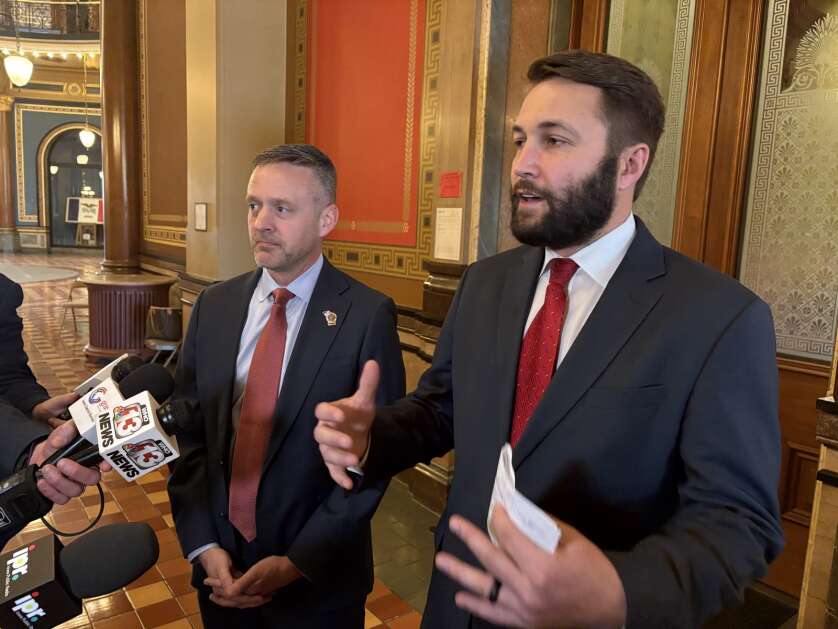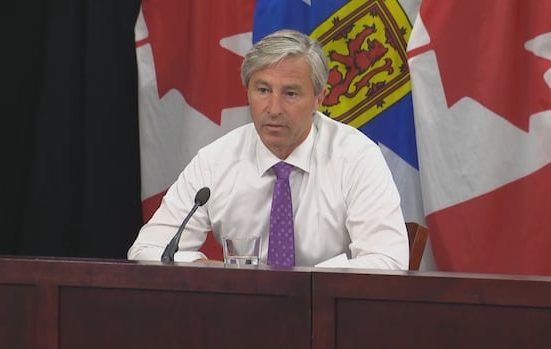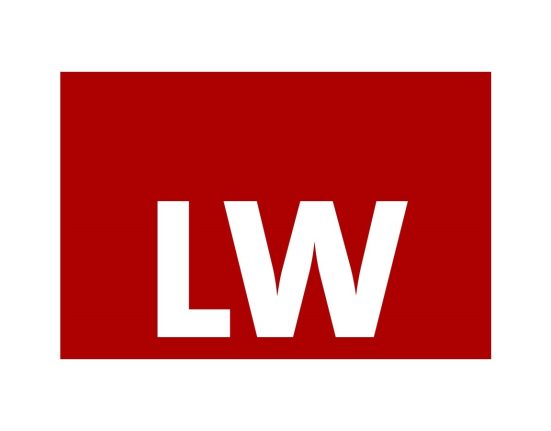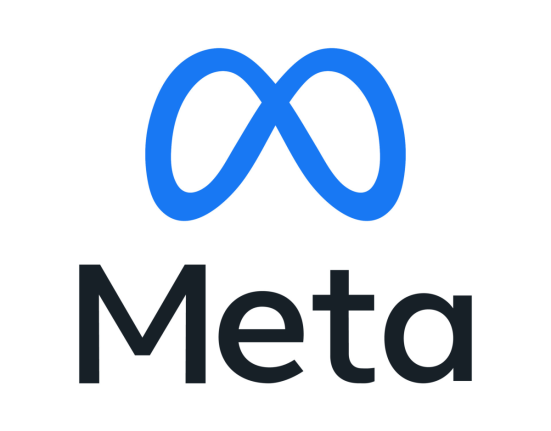The Gazette offers audio versions of articles using Instaread. Some words may be mispronounced.
DES MOINES — Local governments and business groups say they generally support getting rid of Iowa’s complicated property tax rollback system, but continue to explore the fiscal toll they would face from statehouse Republicans’ proposed “reboot” of the state’s property tax system.
Lawmakers held legislative hearings last week on Senate Study Bill 1208 and House Study Bill 313, which their sponsors say would provide Iowans with an estimated $426 million in property tax cuts over five years as the legislation is phased in.
Dozens of stakeholders representing local taxing entities — from cities, counties, school districts and regional transit services — said they remain “undecided” on the complex 52-page proposal.
Rep. Bobby Kaufmann, R-Wilton, and Sen. Dan Dawson, R-Council Bluffs, who chair the tax policy House and Senate Ways and Means Committees, said the bill is a “work in progress” and will continue to gather feedback.
Kaufmann said he anticipates bringing the bill forward to the House Ways and Means Committee in the next two weeks.
“I have committed to moving slowly on this,” he said. “ … I’m sure we’ll have a couple more weeks after that where we will then continue to solicit feedback and hopefully put forth an amendment that most of us can agree on.”
House Speaker Pat Grassley, R-New Hartford, told reporters that lawmakers would be deliberate in making changes to the property tax system. He said Republicans are “not trying to rush anything forward” and were still assessing the full impact of the proposed changes.
“If further conversations have to go on in the next year, I think we’d be open to that. But we also don’t want to, just because something’s hard, just throw our hands up either,” he told reporters earlier this month.
The bills — among other provisions — would:
- Use state general fund dollars to provide about $400 million in school funding currently paid for with local property taxes;
- Cap most property tax levy growth to 2 percent each year, excluding revenue for new construction
- Provide each household a $25,000 homestead property tax exemption;
- Raise an existing property tax exemption for Iowa veterans to $7,000 from $4,000;
- Provide a property tax credit to Iowans 70 years old and older who make less than 350 percent of the federal poverty level;
- Phase out the state’s “rollback” system for residential, commercial and industrial properties by 2030. The rollback rate, calculated each year, limits the amount of property taxes Iowans pay to a percentage of what their property is assessed.
The changes would be phased in over the next five years.
The pair said the legislation builds upon a 2023 property tax bill that exposed large gaps in Iowa’s property tax system and set the stage for deeper reforms. Statehouse Republicans said rising property tax costs were a top concern brought up by voters while they campaigned ahead of the November 2024 general election.
“We could continue to tickle the system and just play around the edges, or we could be responsive and do something bold, which is why I am doing, what we’re doing, and that is a complete rehaul of the systems,” Kaufmann said Wednesday.
Cities and counties voice concerns
Mayors and lobbyists for Iowa cities and counties said the proposed 2 percent revenue growth limitation included in the bill would not keep up with the rate of inflation or the costs to provide public safety and other essential government services.
Des Moines City Manager Scott Sanders said public safety budgets typically grow about 4 percent annually, and account for about 60 to 70 percent of the city’s general fund. A 2 percent cap would force about $2 million in cuts each year, “continuously with no end.”
Amy Campbell, representing Polk County, recommended lawmakers index the cap to inflation or the Midwest Employee Index, noting that human resources and employee costs typically grow 5 to 7 percent annually for services like fire and EMS.
Sanders and others also worry revenues collected through tax increment financing — or TIF — districts would see a large drop and discourage using the public financial incentives to support economic development. Local governments use the increased property tax revenue generated by new development or redevelopment in a designated area to fund public improvements within that area.
Sanders said existing development agreements — some going out as far as 20 years — would see a “significant” drop in new tax revenue they could capture moving forward. As a result, communities may not be able to support the demand for services that TIF-funded projects generate.
Kaufmann acknowledged the concerns and said lawmakers need to work on addressing the TIF component in the bill.
Sanders and other local officials, though, also see positives.
“I do see with this bill the path you’re on to simplicity. And I think that’s a good idea,” Sanders told lawmakers. “I think there are a few challenges, however, with the way it’s written.”
Chelsea Hoye, with the Iowa League of Cities, said the organization still is working to understand the bill’s impacts and help rural communities to conduct financial modeling.
Abigail Maas, a member of the Iowa County Board of Supervisors, said a 2 percent cap would encourage local governments to collaborate and share existing resources.
“Taxpayers don’t understand the current system, neither do most of the people that are levying taxes upon them,” Maas said. “I think this is going to really simplify our budget process. It’s going to make it cleaner, it’s going to make it faster, it’s going to help the taxpayers, and it’s going to get easier for all around.“
State would cover more school funding
Officials representing Iowa school districts raised concerns about the state taking on additional school funding at the same time state revenues are projected to decline due to previously passed state income tax cuts.
Melissa Peterson, representing the Iowa State Education Association, emphasized the importance of adequate funding for public education and the need for flexibility at the local level.
“We appreciate the efforts. We just want to make sure as we move forward, considering we do have declining revenue — which I appreciate to a certain degree was intentional with the previous tax legislation that has been implemented — that we leave ourselves in a situation where we can continue to fund public education adequately,” Peterson told lawmakers. “And that we leave a little flexibility so that individual communities can make sure that they can meet their specific communities’s needs.”
Margaret Buckton, representing the Urban Education Network and Rural School Advocates of Iowa, worried shifting public school funding from local property taxes to the state general fund could make it more difficult for schools to get needed funding.
“It makes it difficult for schools to explain to policymakers and taxpayers why state investment’s going up, but we don’t have more money because it’s offsetting what would otherwise be a property tax dollar,” Buckton said.
The bill would shift K-12 school funding from a uniform statewide property tax levy of $5.40 per $1,000 of taxable valuation to reliance on state general funds by 2031, reducing the school district foundation levy to $2.97 per $1,000 of taxable value.
The statewide tax levy, along with state aid, funds a portion of the regular program and special education foundation base — a calculated amount that represents the cost of providing a basic education to each student.
Under the proposal, lawmakers would capture money from eliminating Iowa’s system of property tax credits, which Kaufmann said would go toward about $400 million in school funding through the state that currently is allocated through local property taxes.
“We mirrored the revenue from the tax credits and directly correlated that with how much we could buy down the education (tax) levy,” he told The Gazette.
Eliminating the rollback rate
After decades spent relying on rollbacks and other fixes that didn’t quite work, Iowa business and taxpayer advocacy groups said lawmakers are on the right track, exploring meaningful levy limits to replace and dramatically improve upon Iowa’s rollback system.
So far, the only groups registered in support of the proposals are Iowans for Tax Relief, the Iowa Association of Business and Industry, National Federation of Independent Business and the veterans service organization American Legion of Iowa.
“There is no fixing what we’re living with now. We have to do a fresh start,” said JD Davis with the Iowa Association of Business and Industry.
Matt Everson, Iowa state director of the National Federation of Independent Business, which represents about 12,000 members in Iowa, said many of the group’s members lease buildings and those costs have “skyrocketed.”
“It’s becoming unsustainable and putting some of their businesses out of business, so we appreciate the holistic approach here — a new approach,” Everson said. “I think it will be a multiyear process, but it starts here.”
The rollback rate is a statewide rate set annually by the Iowa Department of Revenue for each property class. The mechanism has been in place in Iowa since 1977 and limits how much aggregate taxable value can grow statewide each year to 3 percent.
If the statewide increase in values of homes and farms exceeds 3 percent, their values are “rolled back” so that the total increase statewide is 3 percent. The rollback is applied on a class of property, not an individual property, meaning that the statewide total taxable value can increase by only 3 percent due to revaluation.
Instead of that, Iowa would use a “revenue-restricted system.” The bill would roll back tax levies in response to rising property values, kicking in whenever assessed value of existing properties rises more than 2 percent.
The shift is intended to reduce tax burdens while avoiding the distortion caused by the current rollback system. The existing rollback keeps statewide growth in check, but permits large swings in individual counties.
Eliminating the rollback would make the property tax system fairer and easier to understand for taxpayers, Kaufmann said, while phasing in revenue growth restrictions to prevent rising tax bills.
Kaufmann said the change would help address problems local governments have with the rollback system and would provide more certainty for local jurisdictions as they plan budgets over the long term, as they would no longer have to wait until December for the rate to be calculated each year to begin the budget process.
Shifting the tax burden?
House Democrats and city officials, though, warned the bill would shift the property tax burden from commercial to residential property.
Jolly Omar, economic development specialist with the city of Pleasant Hill, said 56 percent of that community’s taxable valuation comes from residential property. But eliminating the rollback would see that rise to 71 percent in five years.
“Commercial, industrial, they are benefiting, but residential taxpayers are paying more dollar for dollar,” Omar said.
Taxable assessed values in Iowa have grown by nearly 27 percent over six years, from $160 billion to $202 billion between 2018 and 2024. That increase would have been much higher had it not been for the rollback system that moderated it, according to the Tax Foundation, a nonpartisan tax-policy research think tank based in Washington, D.C.
Actual home prices in Iowa increased by 52 percent since 2018, while taxes levied on properties increased by 21.97 percent. However, adjusting for inflation, property tax collections declined statewide — with some counties experiencing a drop but others nearly doubling in tax collections, according to the Tax Foundation.
While the bill would increase how much of a home’s value is subject to property taxes, that would be offset by a new $25,000 exemption for each household and new limits in place that would limit property tax growth, Dawson and Kaufmann said.
“I believe our system balances everything with our exemptions and with our simplicity and with our predictability,” Kaufmann told The Gazette.
In 2023, lawmakers passed and Reynolds signed House File 718, aimed at reducing future tax bills. Republicans estimated the changes would save taxpayers $100 million.
That proposal earned strong bipartisan support.
Among the law’s many provisions were limitations on local governments’ collection and use of several tax levies devoted to specific purposes, such as for public library operations.
HF 718 rolled the dedicated tax levies into the overall general tax rate, which are capped. So the dedicated tax levies now are budgeted alongside all other services and must compete with them for local funding.
The law also limits the amount of new tax revenue local governments can capture from a growing tax base, and required certain information about property taxation to be provided to taxpayers and property owners.
The bill set triggers to reduce local property tax levies by certain amounts if valuation growth is 3 percent or more.
Republicans’ proposal modifies the levy rate limitations enacted in 2023.
It would set a new formula that taxing entities use for calculating tax rates, and allows them to capture a portion of growth.
“What might happen in Cedar County and Tipton, my local Family Foods grocery store putting a new addition on for cold fridge (storage) would not qualify as new growth,” Kaufmann said.
The same would be true for home additions and renovations.
“Family Foods putting a second location would qualify as new growth,” Kaufmann said. “This is the part that’s more specific to the urban, high-growth areas. So if Ankeny has $100 of new growth, they will then be able to capture $2 of that for their tax base, which they currently are not able to do at all. So they’re able to get that extra $2 per $100.
“… So when you’ve got a high-growth area like West Des Moines that’s putting up millions and millions and millions and millions of new dollars with the buildings, they’ll then be able to capture that initial 2 percent of new growth to be able to use in their budgets, which they currently restricted from doing” under the 2023 law.
The intent is to protect all taxpayers individually from tax increases, Kaufmann said.
As the Tax Foundation explains: “Imagine two properties in different neighborhoods in the same city, both purchased at the same time for $250,000. One neighborhood takes off, and the home is now worth $500,000. The other neighborhood doesn’t change as much, but since all property values have appreciated, that home’s value increases to $350,000. Setting aside inflation, if property tax rates remain unchanged, one home will see a 100 percent increase in property tax burdens while the other will see a 40 percent increase, neither of which is likely warranted.
“(Tax) levies should be rolled back to avoid these large unlegislated increases, which a levy limit would accomplish automatically.”
Iowa’s current property tax system, the foundation argues, provides insufficient relief in areas that are growing and seeing values rise faster than statewide averages.
Democrats propose $1K homeowner rebate
House Democrats have unveiled their own property tax plan, arguing Republicans’ proposal is too complicated and does not guarantee homeowners would see a decrease in their tax liability.
Their proposal, unveiled Thursday, includes a $1,000 property tax rebate paid to all Iowa homeowners; a $500 rebate to all renters; and a property tax freeze for seniors.
Rep. Dave Jacoby, D-Coralville, the ranking Democrat on the House Ways and Means Committee, said Iowans’ frustration over property taxes “is coming to a boiling point.”
“Because everything we’ve done to date has been totally ineffective,” Jacoby told reporters during a news conference. “How many people’s homeowners and property taxes have gone down in the last 10 years? Nobody. The Democrats have a plan that puts the dollars right back into Iowans’ pockets.”
https://www.youtube.com/watch?v=/1sP4Ob8Sz9s
House File 691 would create a residential rebate program where homeowners would receive a state rebate of $1,000 and renters would receive $500 from the Taxpayer Relief Fund, which had a $3.75 billion ending balance.
Jacoby said Democrats were still running numbers to see whether the state can provide a yearly as opposed to one-time rebate, but believes the fund has enough money to extend the rebates for three to five years, during which time he said lawmakers would come up with a longer-term plan.
Grassley told reporters Thursday that Republicans have planned to use the Taxpayer Relief Fund to cover budget shortfalls as a result of state income tax reductions. Republicans enacted the cuts with the expectation they will spur growth that eventually outpaces spending.
House File 916 would expand the Homeowner Property Tax Credit Program to all seniors over the age of 65. Current law caps the credit for some seniors who meet certain income requirements.
“It helps us keep people in their homes, especially in small town Iowa,” Jacoby said. “This is a freeze; not an elimination. It freezes property taxes at the rate they are when they turn age 65. So they’ll still be paying taxes, but it’ll be able to be predictable.”
He said part of the reason for rising property taxes is that the Republican-controlled Legislature has passed costs for a number of services along to local governments through unfunded mandates.
“The state has abdicated our responsibility to the locals and the locals have had to pick up those numbers,” he said. “So if we eliminate unfunded state mandates, that will help roughly around 13 to 17 percent of the costs that cities, counties and schools have right now.”
Jacoby said he doesn’t trust state government to honor its commitment to schools to make up the difference in education funding, noting lawmakers in 2021 voted to phase out payments to refund, or “backfill,” local governments for commercial property tax cuts passed in 2013.
Kaufmann, speaking to The Gazette, said he intends to put the state’s increased share of school funding on “Autopilot.”
“My plan is to put it into perpetuity with like a 10- or a 15-year expiration date, so a future Legislature can review what we’re doing and see if it’s working,” he said. “ … I would say that taking that money away from schools would be a catastrophic political vote that I know we would have no interest in doing whatsoever.”
Kaufmann, too, said the “backfill” payments were never intended to be permanent, and that lawmakers used the money to shift funding for mental health services away from county property taxes and to the state.
Democrats stand little chance of enacting their proposal in the Iowa Legislature, where Republicans hold agenda-setting super majorities.
Comments: (319) 398-8499; tom.barton@thegazette.com







